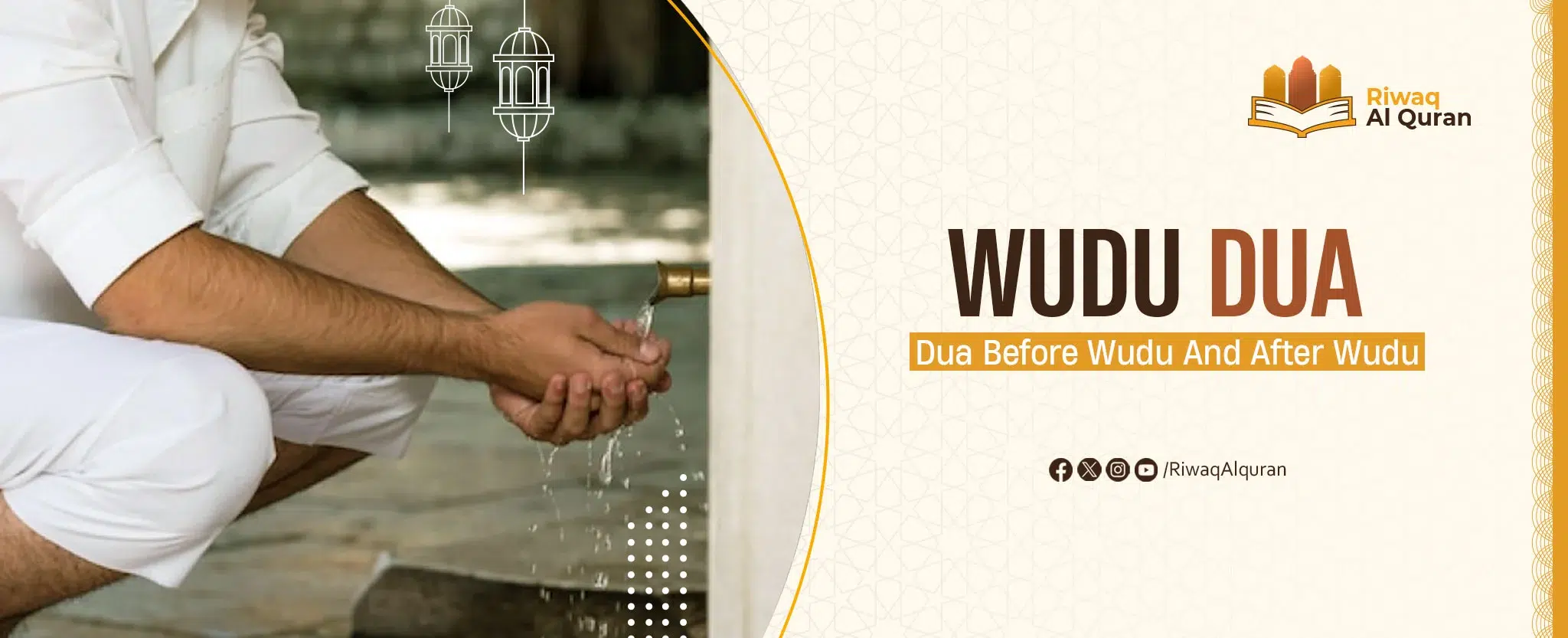Dua is a blessing that strengthens our connection with Allah. At the time of Wudu, Dua helps with purifying our souls together with the purification of our body. The Sunnah of Wudu Duas involves reciting “Bismillah” before Wudu and two recommended Duas afterward, emphasizing repentance, purification, and seeking forgiveness.
These Duas highlight the spiritual aspect of Wudu, cleansing both body and soul. However, scholars advise against introducing new Duas without Sunnah backing for specific body parts during Wudu.
Here are the Sunnah of Wudu Dua
Table of Contents
Wudu Dua Meaning:
Wudu Duas are supplications recited before and after ablution “Wudu”, asking for Allah’s aid, forgiveness, and purification of both the body and soul. These Duas, rooted in the Sunnah, enhance the spiritual significance of Wudu as an act of worship.
Wudu Duas are sunnah acts and are not mandatory for Wudu. The Sunnah recommends Wudu dua saying “Bismillah” before beginning Wudu. After completing Wudu, two Duas are encouraged. The first affirms faith in Allah and the Prophet Muhammad and asks to be among the repentant and purified.
The second Dua praises Allah, seeks forgiveness, and expresses repentance. These Duas emphasize Wudu as not just a physical cleansing, but a means to spiritually cleanse and renew our commitment to Allah.
Dua before Wudu
Dua to say before wudu is:
Arabic: بسم الله
English: In the name of Allah
Transliteration: Bismillah
Saying Bismillah is good before starting any action. Bismillah not only means that we are asking Allah’s aid in it, but also that we are asking Allah’s acceptance for it.
This Dua comes in many hadith.
Read: Sunnah and Pillars of Wudu.
Dua After Wudu
There are Two Dua to say after wudu:
Arabic:
اشهد أن لا إله الا الله وأشهد أن محمد عبده ورسوله
اللهم أجعلني من التوابين واجعلني من المتطهرينEnglish:
I bear witness that there is no God but Allah, and I bear witness that Muhammad is his servant and messenger.
O Allah, please make me from those who repent and those who are cleaned.
Transliteration:
Ash-hadu Anna La ilaaha illa Allah, wa Ash-hadu Anna Muhammed Aabdu-hu wa Rasulo-hu
Allahuma ij’alni Mina attawabeen wa ij’alni mina al-mutatahiren.
This maybe a bit long but it’s easy to learn and say once you get used to it.
The second Dua to say after wudu:
Arabic:
سبحانك اللهم وبحمدك، أشهد أن لا إله إلا انت، أستغفرك و أتوب إليك.
English:
Glorified and praised are you, Allah.
I bear witness there is no God except you.
I ask for your forgiveness and repent to you.
Transliteration:
Subhan-aka Allah-ma wa Bi-Hamdik, Ash-hadu Anna La illaha illa anta, Astaghfir-uka wa atoubo ilik.
These Two dua after wudu are very profound. They remind us that wudu is an act of worship that gets us closer to Allah, and wash our sins not just our body. That’s why we Ask Allah for forgiveness and before that we affirm Shahadah.
You don’t have to always say both. It’s okay to say one or alternate between them.
And Allah knows best
Read more about Wudu with Socks: Masah or Wiping over Socks and Khuf
Experience Riwaq Al Quran Classes
Watch real moments from our live sessions at Riwaq Al Quran and see how we bring learning to life. These clips highlight our interactive, student-focused approach designed to keep learners engaged, motivated, and actively involved in every step of their educational journey.
Dua before washing face, hands, or feet
There is no Sunnah or a specific Dua to say before or after washing each individual body part. Scholars have said that such duas may be counted as innovation, as it wasn’t from the way of the prophet peace be upon him or his companions. (Review Scholar’s source.)
General dua at general time is okay, but to make a specific dua tied to a specific time has to be backed by Sunnah, because it’s a form of ibadah (Worship).
Read more about: Dua Etiquette: Can you make Dua without Wudu?
Why Students Love Learning with Riwaq Al Quran
Hear directly from our students about how Riwaq Al Quran Academy has transformed their connection with the Book of Allah. Their experiences reflect the dedication, care, and quality that guide every step of our teaching.
Learn Quran, Arabic And Islamic Studies Online With The Best Native Tutors
Riwaq Al Quran is a comprehensive online platform that offers personalized Quran, Arabic and Islamic Studies Online classes for individuals of all ages and backgrounds.
Their experienced instructors use a structured curriculum to cover Tajweed, Tafsir, and Memorization, providing easy and effective access to learning the Quran.
The advanced online classes allow for seamless communication and interaction between students and teachers. Join Riwaq Al Quran for a deeper connection with the Quran.
We offer several courses such as:
- Online courses for kids.
- Online Quran classes for kids and adults.
- Online Arabic courses
- Online Ijazah courses
- Online Islamic Studies courses.
Conclusion:
The Sunnah of Wudu Duas underscores the spiritual dimension of ablution in Islam. Reciting these Duas before and after Wudu serves as a means to seek Allah’s aid, express repentance, and purify the soul. The simplicity and profundity of these Duas reflect the essence of Islamic worship, emphasizing sincerity and reliance on Allah.
However, scholars warn against introducing new practices without Sunnah backing, highlighting the importance of adhering to established traditions. Overall, incorporating these Sunnah Duas into one’s Wudu routine can enhance spiritual mindfulness and deepen the connection with Allah during acts of purification.
And Allah knows best.


































